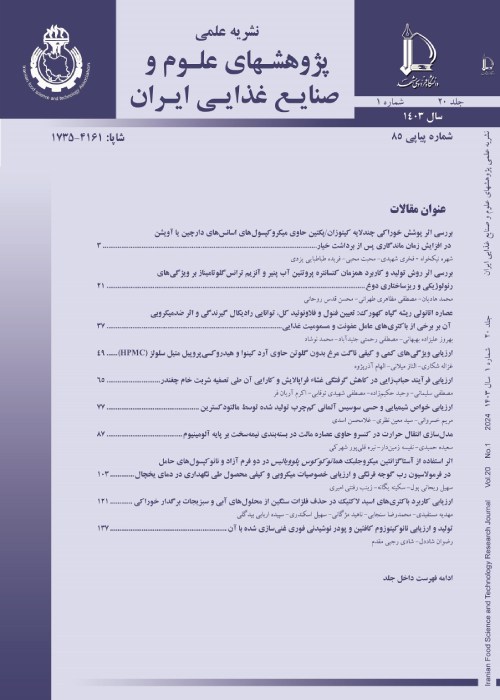Production and Evaluation of Caffeine Nanochitosome and Instant Drink Powder Enriched with It
Author(s):
Article Type:
Research/Original Article (دارای رتبه معتبر)
Abstract:
Introduction
Caffeine is one of the most common bioactive compounds in the world that can enhance mental and physical performance However its bitter taste has created challenges for the use of this compound in food. Nano-encapsulation technology, such as the use of liposomes, is one of the simplest ways to overcome this issue. In this research, caffeine was encapsulated in nanoliposomes coated with chitosan and then the drink powder enriched with caffeine nanochitosome was produced.Materials and methods
In this research, pure caffeine powder was purchased and stored in dry environment at room temperature. Ethanol (96%) and acetic acid were obtained from Mojallali Company, Tween 80 from Merck Company (Germany), lecithin (P3556), cholesterol (C8667), and chitosan (medium molecular weight) purchased from Sigma Aldrich Company (Germany). Sugar, essential oil and citric acid used in the formulation of the drink were purchased from a local store.First, nanochitosomes in ratios of 9:1, 8:2 and 7:3 lecithin-cholesterol, were prepared using thin-layer hydration method. Then, the particle size and zeta potential were measured to determine the characteristics of the produced particles. Encapsulation efficiency was measured for 9:1, 8:2 and 7:3 lecithin-cholesterol ratios. The stability of the chitosomal sample with a ratio of 9:1 lecithin-cholesterol was evaluated through visual observation of precipitation formation and the amount of release of encapsulated caffeine during 60 days of storage at ambient temperature was calculated. FTIR was performed for each of the components of the wall of chitosomes, caffeine powder, chitosomal solution containing caffeine and chitosomal solution without caffeine with a ratio of 9:1 lecithin-cholesterol. Nanochitosomes with 9:1 lecithin-cholesterol ratio were used in the formulation of beverages due to having the smallest particle size, favorable zeta potential, the highest microencapsulation efficiency, and high stability during storage. The drink samples were prepared in different formulations (samples containing 3 and 5% free caffeine solution, samples containing 3 and 5% chitosomal caffeine solution and the control sample). Then, the drinks were evaluated in terms of sensory characteristics and other physico-chemical characteristics (pH, acidity, Brix degree, etc.). The drinks produced were turned into powder with a freeze-dryer machine, and two important characteristics of powdered products, i.e. water solubility index and their hygroscopicity, were evaluated.
Results and Discussion
The average particle size and zeta potential for different ratios of lecithin -cholesterol were obtained in the range of 133.3-443.6 nm and +40.96 to +48.36, respectively. The encapsulation efficiency for 9:1, 8:2 and 7:3 lecithin-cholesterol ratios were 91.2%, 86.18% and 79.09 %, respectively. The chitosomal sample with 9:1 lecithin-cholesterol ratio showed good stability during 60 days of storage at ambient temperature. FTIR results showed that caffeine was loaded in nanochitosomes. The results of the sensory evaluation of the prepared beverages showed the acceptability of the taste of the samples containing caffeine nanochitosome compared to the samples containing free caffeine, which indicates the success of chitosomal nanocarriers in covering the bitter taste of caffeine. The results of measuring the color of different drink samples showed that there is no significant difference between the color of samples. The results of measuring pH and acidity did not show significant differences between different drink samples. The results of measuring the solubility of different drink powder samples showed that the samples containing caffeine nanochitosomes have low solubility compared to other drink powder samples. Also, the hygroscopic amount of the drink powder containing caffeine nanochitosomes was lower than the other samples, which is considered as an advantage for powdered products.The results obtained in this research showed that nanochitosomes are an efficient system in covering the bitter taste of caffeine. Therefore, with the production of caffeine nanochitosomes and its usage in the formulation of powder drinks, it is possible to produce energizing and desirable drinks without the need to use high amounts of sucrose.
Keywords:
Language:
Persian
Published:
Iranian Food Science and Technology Research Journal, Volume:20 Issue: 1, 2024
Pages:
135 to 152
magiran.com/p2701005
دانلود و مطالعه متن این مقاله با یکی از روشهای زیر امکان پذیر است:
اشتراک شخصی
با عضویت و پرداخت آنلاین حق اشتراک یکساله به مبلغ 1,390,000ريال میتوانید 70 عنوان مطلب دانلود کنید!
اشتراک سازمانی
به کتابخانه دانشگاه یا محل کار خود پیشنهاد کنید تا اشتراک سازمانی این پایگاه را برای دسترسی نامحدود همه کاربران به متن مطالب تهیه نمایند!
توجه!
- حق عضویت دریافتی صرف حمایت از نشریات عضو و نگهداری، تکمیل و توسعه مگیران میشود.
- پرداخت حق اشتراک و دانلود مقالات اجازه بازنشر آن در سایر رسانههای چاپی و دیجیتال را به کاربر نمیدهد.
In order to view content subscription is required
Personal subscription
Subscribe magiran.com for 70 € euros via PayPal and download 70 articles during a year.
Organization subscription
Please contact us to subscribe your university or library for unlimited access!


